Anna at the BBC
Home Page / Television Home Page
Me and the BBC or should that be the BBC and I?
Eventually, this whole front section was given over to Minis (only on this side of the gates) as they were the only cars that would fit - I would love to find an image of a full row of them. We actually parked in reverse to this picture - but this is image (taken from the official handbook) is well before the Minis took over - a chicken wire fence was erected to make a boundary from the pavement and the minis backed into or drove bonnet first into the chicken wire leaving a narrow space to manoeuvre against the wall. To reach the space it was a requirement that we drove through the gates, around and out - we were not permitted to access the parking area from the road direct - the Commissionaires held the last word and many a time I ended up having to park in White City!
farewell Education
So ok here I am - it's 1973, I'm 21 and therefore an adult, my education is completed as far as I want it to be at this stage and the world is at my feet. The worlds is also my oyster - I know what I want to do and where to do it, I was prepared to make decisions for myself and 'seize the day.' No 'gap' year for us in those days - in my case I really didn't need one. I was well-travelled, fluent in two global languages and had a third tucked away in my CV! I'd had a wealth of work and life experience already. As soon as my 'O' levels had been completed I started to work in all my school and college holidays to earn enough money to have a decent holiday somewhere abroad. Eventually I had become so popular with clients of the Temping Agency that I found myself in demand to cover at Christmas and Easter breaks as well as in the Summer. I'd worked in every conceivable and diverse industry that Nottinghamshire could offer. I'd seen it all from the coal mining industry to finance institutions, solicitors to the police, Boots and John Player and a fabulous paper producing outfit by the name of Wiggins Teape who sent me off after I had completed a few weeks there with enough paper and stationery to last me for several years!
But back to the pivotal time - I went to see my agency mentor Yvonne and told her that I was available to work and wasn't too fussed about what to do as I was looking around for something to suit my professional qualifications. I already had a foothold at the Nottingham Playhouse as I was and had been their Saturday Stage Door Keeper for several years now. Coincidentally, many of the actors I got to know well whilst working on Stage Door would cross my path again when I moved to London and a goodly amount of them recognised me - wasn't that nice?
Anyway, the previous summer I had spent a very long time, in fact the full 8 weeks I could offer in work time at Newark Police Station, they had intimated that they would be glad to see me again, so I mentioned to Yvonne that I was still mobile enough to go anywhere and if Newark wanted me - they could have me. She smiled and was about to explain that she would decide where to send me when the phone rang as I was sitting there and I could hear her taking down details of the work request and my heart sank as I heard the words PMBX operator - I hated those little switchboards! Yvonne also said into the phone - yes, I have someone here now who can be with you in half an hour. The call was from the BBC situated at Willson House on Derby Road, next to the Cathedral which was a 10 minute walk from the City Centre where I was sitting right then.
The decision had been made for me - I was to start work at the BBC News Office immediately.
The Nottingham BBC News 'hub' was tiny. Granted, we occupied the whole of the top floor of the building (Probationary Service on the floor below) and the 'Jaeger Shop' store front on the ground floor, but we were tiny. On entering there was the 'Reception' area where I sat and shared the outer office with the Education Secretary. Her boss's office could be accessed from our communal area or from a separate door in the corridor. Opposite from us was a small cubby hole which housed the Sound and Camera Team who were rarely there and it was of course akin to a junk shop. The area next to that was a small reception area for visitors. At the end of the corridor on the Reception/Team side were the amenities and the tea making area. Opposite on the other side was the main News Reporters Office which could only be accessed from the corridor unlike the dual capacity exit and entry afforded to the Education side. The rest of the space was devoted to the whole business of television broadcasting and sound studios and was the domain of Terry. There was also a rear exit which went straight down to the carpark.
When I started there the staff consisted of all those already mentioned and a visiting Reporter, the late great Dennis McCarthy who was filling in for the resident Reporter, Bruce Myles who was away on secondment somewhere covering national news. Dennis, a freelance, followed the money and shared himself between television and his regular radio spots at BBC Radio Nottingham. Sometimes we didn't see him for days but when he was around he was a living tornado and messy to boot! But he was a fabulous raconteur and must have found it difficult to conform to Pebble Mill's demands for 'factual' newscasts - they weren't madly keen on his 'whimsical' fillers but mostly used them. He was also a terrible prankster and a little difficult to be around until you got used to his 'ways'. On one occasion he selected me for one of his forays into the unknown. We had been advised by Pebble Mill that after a whistlestop tour of our premises it was decided we should get a matching tea service for our guests - we had a motley selection in the kitchenette some of which were even the ubiquitous green cups and saucers that littered the BBC at the time, but as mainly we used our own mugs and rarely had visitors we were surprised at the directive from on high!

With grateful thanks to Yay Retro for actually having the exact cups on their website!
Dennis told me we'd go to Marks and Spencer and get something as close as we could to the BBC line. By then I had got to know him better and told him that I would go with him but wouldn't stand for any of his nonsense, I was, after all only the Temp! We got about as far as the Albert Hall when he started straying off at a tangent and then doubling back and leering - he had a good leer! As by then we were half way to M&S I didn't think I'd achieve anything by stomping off. In the shop the real act started and he literally left me to sort out the china. I wasn't sure what was needed and called him over to express an opinion on a non-chintzy variation that I thought would be neutral enough to do. Then he exploded and his voice, of course, carried! He said something on the lines of 'For goodness sake woman, we've ben married three months can't you make a decision even now' well I must have turned puce with embarrassment (so much for the sophisticated 21 year old) and probably resembled a goldfish gasping for oxygen. It took me a long time to forgive him but it finally broke any reserves and from that time on I was able to say anything to him - good or bad. No sooner had that relationship arrived at an even keel than the Bruce came back. He was not a happy bunny, he had, I think hoped for better things and to not have to come back to BBC EM. To say that he was a completely different type of character would be a waste of time and stating the obvious!
(To be continued)
My Co-Workers at the BBC (Nottingham and TC)
Bruce Myles - Reporter for East Midlands Today (Nottingham)
A rather unfortunate (but only one I can find at present) image of Bruce Myles in 1981 courtesy of the BBC Archive
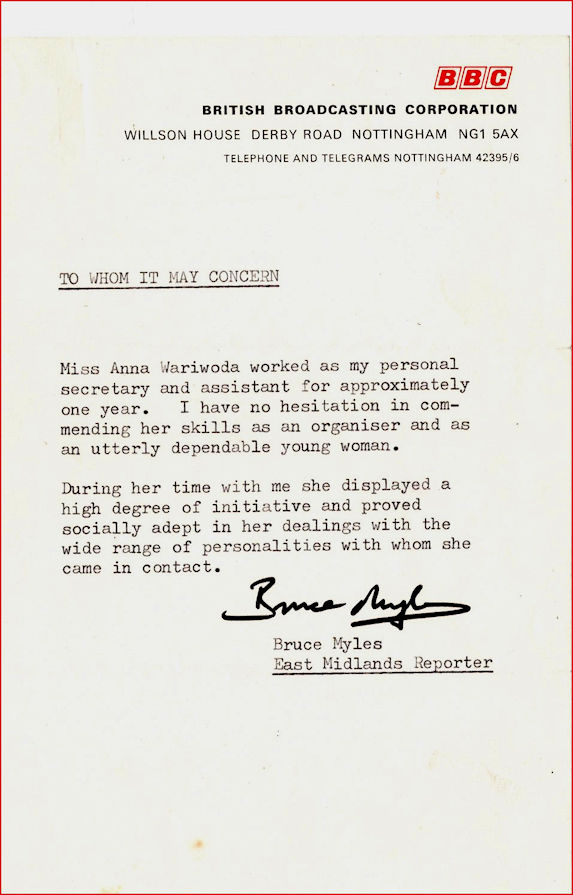
At least one original thing that I have as my own is the reference Bruce Myles (plus the two books he also gave me on my departure day) compiled for me as I departed for London and the 'fleshpots' (as described in a congratulatory telegram sent to me from the Pebble Mill staff).
Dennis McCarthy - Freelance Reporter for East Midlands Today (Nottingham)
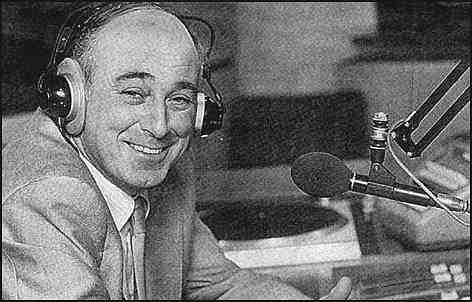
Dennis doubled up as a radio newscaster for Radio Nottingham and freelancing for BBC East Midlands Today television news
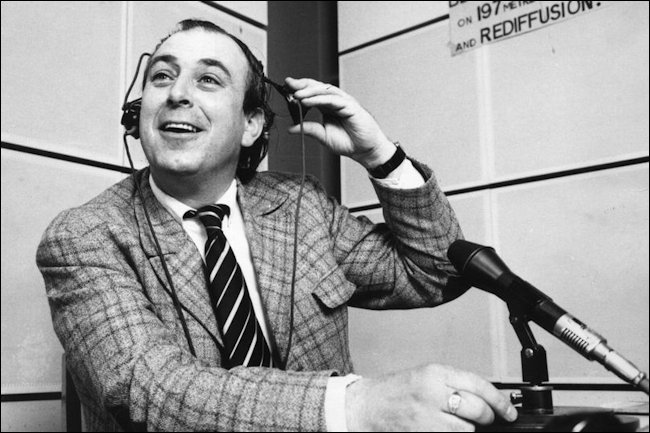
Finally, in 2018 I have managed to source a decent image of 'Slippers' entitled 'in his early broadcasting years. This is thanks to BBC Radio Nottingham celebrating its 50th anniversary this year - considering Pebble Mill and Television Centre are no longer in the BBC 'stable' this is quite an achievement! Image sourced from the Nottingham Post
The Nottingham Post pays this tribute :
Nottingham broadcasting legend Dennis McCarthy is honoured with a Castle Rock ale
The arrival marks a landmark BBC Radio Nottingham anniversary Dennis McCarthy, the London-born broadcaster who came to Nottingham as a wartime refugee and went on to become the city's best loved radio personality, is to be honoured in the pubs and bars of his adopted city with an ale brewed in his memory.
Castle Rock's first Nottinghamian Celebration Ale of 2018, 'Dennis McCarthy' has gone on sale at pubs across Nottingham, the East Midlands and Yorkshire. Its arrival coincides with celebrations to mark the 50th anniversary of BBC Radio Nottingham, which began making programmes on 94.8VHF and Rediffusion Channel C in Nottingham on January 31, 1968 His daughter Tara said: “What a wonderful way to celebrate Dennis’ memory in time for the 50th anniversary celebrations of Radio Nottingham by a local brewery with an extremely impressive setup. Dennis would have enjoyed a half of his London Porter, sitting in one of Castle Rock’s many impressive pubs." The ale is a 4.3 abv London Porter, a style chosen by Tara to mark her father's birthplace in the East End of London. Castle Rock's Lewis Townsend described it as an ideal winter warmer. "Basically this is an English porter; but there are two additions of locally roasted Colombian coffee, one in the hopback and one much later in the brewing process. This has given the beer a wonderful front-end rich coffee aroma as well as a great depth, thanks to the complex malt we've used."
Dennis McCarthy was a family man, proud of his children and the MBE awarded in 1991 for services to broadcasting. Prior to his time on the wireless, he had been a decorator, washing-machine salesman and dog-breeder. It was an interview he did on spec at Crufts dog show that convinced radio bosses to give him a job on air. By the mid 1980s, his Sunday morning show, co-presented by Tara and produced by son Digger, attracted one in six of the Nottinghamshire's public. On the day of his funeral in 1996, more than 20,000 fans lined the route to show their respects. The Nottinghamian Celebration Ales series is Castle Rock's homage to celebrated native and adopted sons and daughters of Nottingham. Four ales are brewed each year.
From Castle Rock Brewery :
Dennis McCarthy
London-style porter brewed with locally roasted coffee - 4.2% ABV

Number 30 in the Nottinghamian Celebration Ales range, this beer celebrates Dennis McCarthy, BBC Radio DJ most known for his work on Radio Nottingham but also Radio Leicester, Derby and Lincolnshire between 1968 and 1996. Inspired by where he grew up, his namesake beer is a London Porter, but we’ve livened it up with two distinct infusions of fresh, locally roasted Colombian coffee.
Gerald Savory
Former Head of Drama Plays, Producer Play for Today 'Churchill's People' vilified and voted as the worst ever made drama series for the BBC, brought 'Take Three Girls' to the BBC and 'Mapp and Lucia' to LWT.
Biography :
One of the great impresarios of television, and certainly one of the wittiest and most self-deprecating, Gerald Savory was curiously undervalued in his time. Amongst other achievements, his first stage play, written at the age of 27, ran for two years; he worked for Alfred Hitchcock and was taken by him to Hollywood; he gave Grace Kelly her first job in Chicago; directed live television in New York; adapted classics for television and spent eight years at BBC television as a drama executive at a boom time in the 1960s and 1970s. His first and second jobs were as stockbroker's clerk and private tutor, but in 1931 he started acting, against the wishes of his mother, Grace Lane, who was herself an actress. The first play he wrote, George and Margaret, ran 799 performances in the West End and was filmed in 1940, by which time Savory had become an American citizen, rewriting other people's scripts in California. He was unceremoniously fired from MGM after he refused to work on Ninotchka because he couldn't stand "the Swedish cow", as he referred to Greta Garbo. After directing summer stock in Chicago, he was introduced by Grace Kelly's father to directing television in New York, including The Robert Montgomery Hour. He told me how when he directed Lon Chaney Jnr on television, Chaney had mistaken the transmission for a dress rehearsal with hilarious results.
I met him at Granada in 1964 where he was on a regular writer / producer contract, adapting Saki, J.B. Priestley, Noel Coward and Tennessee Williams with great elegance, producing Giles Cooper, Philip Mackie and many others. He had been persuaded to join the company, as had many at the time, as a result of his experience in American television. Silver-haired, softly spoken and urbane, Giles Savory was considerate even to lowly beings, as opposed to the macho, shouting, drunken style of many Granada producers of the day.
He left Granada in 1965 to go to BBC Television as Head of Serials. By 1969 he was Head of Plays and, to my enormous surprise, asked me to produce for BBC2. It didn't matter to him that I'd never been near a television play before, so I accepted. The first job was a 1970 series entitled The Six Wives of Henry VIII, 540 minutes and BBC2's first in colour. He kept the lightest of hands on the tiller, but the Seventies were a boom time for him. From his department came Cathy Come Home; Edna, The Inebriate Woman; In Two Minds (Mercer); Mad Jack; The Lie (Bergman); and Cider With Rosie. Henry VIII was a hit and for a while he refused to consider the obvious sequel. "The best sequel," he decided, "is no sequel." Eventually he relented. "I can be as small-minded as the next man," he said, and Elizabeth R followed. Then came Dennis Potter's Casanova in 1971, which he agreed to in a matter of minutes, though it was a risky project even for the Seventies. He wrote me a rare memo to protect himself. "You assured me," went one paragraph, "that the naked nun in Episode 5 would be shot with circumspection".
You might meet Vincent Price or Louis Jourdan at the parties he and his delightful wife Sheila would give in their Mayfair flat, but there was no doubt of the people he really didn't care for. He had a low tolerance for pretension and a then unfashionable wish to entertain rather than improve his audience. But he let producers get on with what they wanted to do without much interference. Stopping one in the corridor, Gerald asked how the producer's new show had turned out. "Well," said he, "when it's been shortened a bit and has all its effects and music, it'll be fine." "Bad as that, eh?" said Gerald.
Gerald Douglas Savory, playwright and television producer: born 17 November 1909; four times married; died 9 February 1996. Source : Obituary written for The Independent by Mark Shivas a long-time co-worker in the BBC's Drama Plays department.
Credits sourced from : popflock.com
Gerald Savory (17 November 1909 - 9 February 1996) was an English playwright and screenwriter specialising in comedies. The son of actress Grace Lane (1877-1956), he was educated at Bradfield College and worked as a stockbroker's clerk before turning to the stage (Hull Repertory Theatre Company 1931-33), first as an actor then a writer. His earliest work in the film industry was as a dialogue writer for director Alfred Hitchcock's Young and Innocent (1937). He spent some time in the United States in the 1940s writing for film and television and became an American citizen. From 1964 to 1965 he was writer, producer and production manager for Granada Television, producing five episodes of ITV Play of the Week; adapting Saki, J.B. Priestley, Noël Coward and Tennessee Williams for television. He then joined the BBC, first as Head of Serials, then Head of Plays. He notably produced five episodes of the thoroughly panned Churchill's People (1975-76) and six of the eight episodes of Love in a Cold Climate for Thames Television in 1980.
Plays
- George and Margaret 1937 (377 performances in the West End, filmed in 1940)
- Hand in Glove 1944 with Charles K. Freeman based on his own novel Hughie Roddis
- A Likely Tale 1957
- A Month of Sundays 1957
- So Many Children 1959
- Cup and Saucer 1961
- Twinkling of an Eye 1965
Novels
- Hughie Roddis 1942
- Behold This Dreamer 1943
Television
- Count Dracula1977
- Mapp and Lucia, Series One 1985; Series Two 1986
'Take Three Girls' - Drama series devised by Gerald Savory about three single girls sharing a London flat between the end of the 'swinging' sixties and the start of the 'glam' seventies. They were: posh cello-playing deb Victoria Edgecombe (Liza Goddard), failed actress Kate (Susan Jameson) and Cockney art student Avril (Angela Down). Each week the story concentrated on the ups and downs of one girl in particular (episode titles would sometimes reflect this-the first one was titled 'Kate, Stop Acting', episode three was 'Requiem For Cello In SW3') giving the series something of an anthology feel. Successful enough to return for a second series although when it did only Victoria remained (Kate had got married and Avril had taken a job in Paris) and she was now joined by new flatmates Jenny (Carolyn Seymour), a young journalist, and American psychology graduate Lulie (Barra Grant). A host of guest stars appeared in the series, among them Stephanie Cole, Peter Bowles, Sally Thomsett, Anthony Valentine and Maurice Denham were all on their way to television immortality. Eleven years later the original girls (and actresses) were reunited for Take Three Women - four episodes shown on BBC2. Victoria was a widow with a young daughter, single Kate had a 13-year old son and Avril owned an art gallery. Gerald Savory produced the later series and the reunion was completed when the group Pentangle, who performed the original theme music ('Light Flight') reformed to provide the music once more.
From left to right Angela Down, Susan James and Liza Goddard
'Churchill's People'
This was Gerald's swansong at the BBC and he, Brian Rawlinson (Script Editor) and I made up the producer's team not to be confused with the 'production' team which was exclusively brought together for each episode in production. As there were 26 episodes we really swept up all the talent we could - from IMDB I was able to piece together our star (and very well known these days) directors and writers. To think I worked with all these people!
If I start cherry picking the cast it may even exceed the above - full cast members can be found here but a few (in no particular order) included :
Alfred Lynch, Bernard Hepton, Jeremy Kemp, Ray Barratt, Rodney Bewes, Tom Conti, Brian Cox, Edward Fox, Ian Hendry, Alan Haward, Gemma Jones, Dinsdale Landen, Michael Kitchen, Bryan Marshall, Leo McKern, Clive Francis, Evi Hale, Charles Gray, Robert Hardy, Arthur Lowe, Anna & Daniel Massey, T P McKenna, Brian Blessed, Patrick Troughton, Dennis Waterman, June Brown, Annette Crosbie, Rosalie Crutchley, Donald Gee, Jeremy irons, Nigel Stock, Philip Madoc, Robin Ellis, Wolfe Morris .......... And yes, for the eagle eyed it was very top heavy with male actors!
But it failed miserably! The Sunday Telegraph bellowed ' Churchill's People is a co-production disaster ... it not only sounds like a school's radio programme but looks like it too!" Then television criticisms started appearing "When the BBC carefully fail to provide an 'advance viewing' of 'a major new series' for critics, the omission is seldom due to forgetfulness or modesty. It means they fear ......"
And so, having started in the prime Drama slot following the news, after the first four or five episodes, it was tucked away to a much later evening slot!
Brian Rawlinson - Script Editor/Actor
Brian Rawlinson as Robert Onedin and as I remember he looked when I worked with him.
A greatly respected actor whose versatile credits range from quintessentially British Classic Films such as 'Far from the Madding Crowd' and popular soaps 'Z Cars' and 'Coronation Street to appearing regularly in the 'Carry On' films. He is possibly best remembered as Robert Onedin (brother to James and Elizabeth) in 'The Onedin Line' an immensely popular BBC Drama set in the shipyards of Liverpool at the turn of the 20th century. Brian temporarily turned his back on acting to become the script editor on 'Churchill's People' and his portrayal of Robert Onedin was sadly missed - I think we all breathed a sigh of relief when he returned and took up the reigns as Robert once more. He exacted his revenge on his sojourn on 'Churchill's People' by appearing on 'TV Hell' " * a theme night that BBC 2 ran in 1992 and which focused on bad (unsuccessful) television programmes."
In suitable shaded surroundings, Brian Rawlinson gently told us what was on his mind.
"They were in a terrible fix really. They got this monumental piece of programming with an awful lot of good talent associated with it; but what to do with it? You see it was rather like, you know that terrible vase that Auntie Florrie sent you and you think where are we going to put it? Who knows after the next whatever it is, somebody may dig them up and who knows they may become unbelievable archival material." (Transcribed from the recording)
* The You Tube clip has now been 'removed' so I'm pleased I was able to transcribe Brian's comments before they disappeared totally.
A genial man to the end, Robert died in 2000.
Irene Shubik
Freelance Producer for Drama Plays known for 'The Wessex Tales' and 'The Mind Beyond' and infamous for bringing 'Rumpole of the Bailey' to the BBC and losing it to Thames Television and her former friend Verity Lambert. (Credits link)
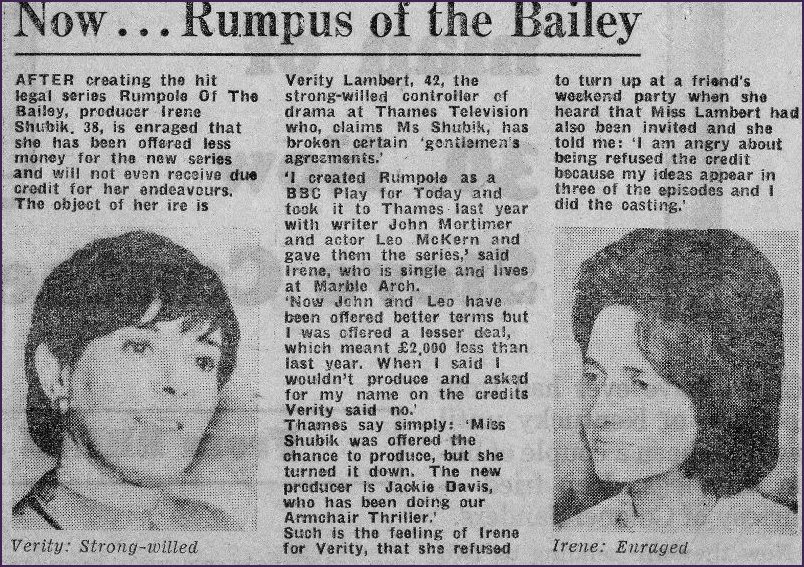
Irene & "Baftagate"
In 1991, a controversial selection was made in the Best Drama Serial category, when Prime Suspect beat G.B.H. to win the award.[1] Following the ceremony, four of the seven voting members of the jury signed a public statement declaring that they had voted for G.B.H. to win.[1] Jury chairperson Irene Shubik, who did not cast a vote, refused to comment publicly on the affair, but BAFTA Chairman Richard Price stated that the ballot papers passed on to him by Shubik had shown four votes for Prime Suspect and three for G.B.H.[1] Price claimed that the ballot papers could not be recounted as they had subsequently been destroyed. No blame was ever attached to Shubik by the four judges, and it was to her that they had initially turned to raise the apparent discrepancy with BAFTA. Source : WikiZero
Irene Shubik obituary (The Times)
Pioneering television producer who could be difficult and cantankerous but had unerring instincts when it came to drama
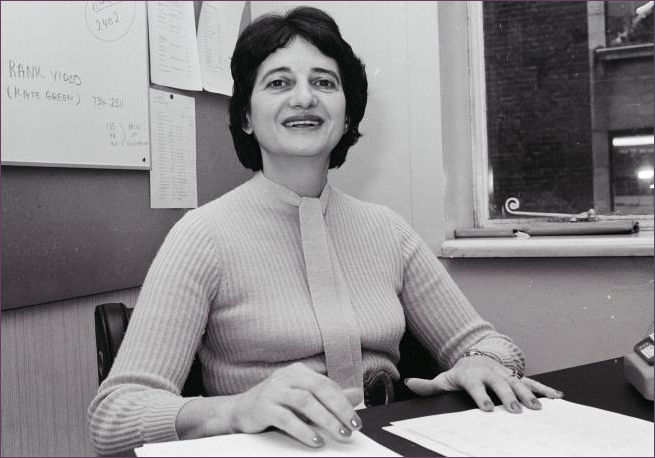
Irene Shubik in 1980 - exactly as I remember her even though we had parted our ways three years previously - image as used in the Obituary which appeared in the Times
Irene Shubik enjoyed proving television executives wrong. As a BBC producer she commissioned John Mortimer to write six scripts for what was intended to be the first series of Rumpole of the Bailey. When the BBC put the project on hold, she left for ITV and took Rumpole with her. The result was one of Thames Television's most popular productions, running to 44 episodes over seven series between 1978 and 1992, with Leo McKern starring as the raffish barrister Horace Rumpole. "I wouldn't say the BBC threw away a pearl richer than all its tribe, but it has mislaid a tasty box of kippers," the critic Nancy Banks-Smith observed tartly in The Guardian. The series was so successful that McKern complained that the role had become an "insatiable monster" and grumbled that his obituary would ignore the other achievements of a 50-year theatrical career and simply say "known to millions as Rumpole".
Shubik was blocked again by bean-counting executives at Granada Television when she proposed an adaptation of Paul Scott's The Raj Quartet. Told that the cost of filming in India was too high, she suggested a cheaper adaptation of Scott's Booker prizewinning novel Staying On. Like The Raj Quartet, the book was set among the British expat community in India. Hoping to use it as a pilot that would force Granada into a change of mind, she recruited Trevor Howard and Celia Johnson for the central roles, the first time they had been together on screen since Brief Encounter 35 years earlier. Shubik was once again proved right. The success of Staying On persuaded Sir Denis Forman, the chairman of Granada, to give Shubik the green light to proceed with her adaptation of The Raj Quartet. Broadcast in 1984 in 14 parts under the title The Jewel in the Crown, the series rivalled Brideshead Revisited as the finest achievement of 1980s British television drama. Two decades later the British Film Institute (BFI) voted The Jewel in the Crown 22nd in its list of the 100 Greatest British Television Programmes. Ironically, having won her argument, worked extensively on the scripts and researched the background and locations, Shubik did not stick around to produce the series. By the time The Jewel in the Crown was filmed, she had been headhunted by Columbia Pictures to work on the screenplay of the film Girl in a Swing. However, each episode of The Jewel in the Crown contained the line "series devised by Irene Shubik" in the opening credits.
Irene Shubik was born in Hampstead, London, in 1929, the daughter of Joseph Shubik, a Russian-born émigré who ran a textiles company, and Sara (née Soloveychik). The youngest sibling in a distinguished trio, her brother Martin was an emeritus professor of economics at Yale, and her elder brother, Philippe, became a leading cancer researcher. When the Second World War broke out, Irene, her mother and younger brother were sent to live with relatives in Canada. She returned after the war to read English literature at University College London and obtained an MA in "The Use of English History in Drama from 1599-1642". After being turned down for a job by the BBC, she emigrated to the US, staying on campus with her brother Martin, who was teaching at Princeton. When he was disciplined for keeping a woman in his quarters, his insistence that she was his sister cut no ice and she moved to Chicago, where her brother Philippe was working. There she landed a job as a scriptwriter with the film department recently set up by Encyclopaedia Britannica before returning to London to look after her ailing parents. Her first job in television came with ABC in Manchester in 1960 as an assistant story editor. She was interviewed on a Friday and started work the next Monday, Sydney Newman, the head of drama, telling her that she was being employed not on the strength of her CV, but because she had "an intelligent face". Newman also told her he "didn't want to do any costume crap" and appointed her to work on the Sunday night drama series Armchair Theatre. She proposed a science-fiction version of the slot and the result was Out of this World, hosted by Boris Karloff. When Newman joined the BBC in 1962 he took Shubik's intelligent face with him and she continued to produce landmark sci-fi drama in the BBC Two series Out of the Unknown. "I had to read hundreds of stories to pick a dozen," she recalled. "You have no idea how difficult some of these authors are."
Nevertheless, she found futuristic tales by JG Ballard, Ray Bradbury, Frederick Pohl and John Wyndham that lent themselves brilliantly to the format. Her favourite, however, was Isaac Asimov, whom she travelled to New York to meet and pronounced "one of the most interesting and amusing men" she had met. She put half a dozen of Asimov's stories on the screen and enjoyed another significant coup when she persuaded JB Priestley to adapt Mordecai Roshwald's post- apocalyptic novel Level Seven. In 1967 Newman invited her to become one of two producers on BBC One's flagship drama slot The Wednesday Play. When she expressed a reluctance to leave Out of the Unknown, the invitation was reissued as a "command", although she was allowed to commission a third series of what she called her "brainchild" before moving. She stayed for eight years, overseeing the slot's transition to Play for Today and producing dozens of memorable and sometimes controversial dramas, including 1971's Edna, the Inebriate Woman, which gave Shubik a second entry in the BFI's list of the 100 Greatest British Television Programmes. Mortimer's Rumpole also had his origins in Play for Today when the barrister made his screen debut in what was originally commissioned as a one-off in 1975. The barrister was originally named "Horace Rumbold", but Shubik insisted on the change after she found somebody with the same name in the phone book. She was also responsible for casting McKern, against the wishes of Mortimer, who wanted Michael Hordern. "John initially was very against it, I think possibly because Leo's dimensions were very like his own," she observed.
She held trenchant views about the need for "structure" and "naturalness" in TV drama, and she provoked considerable controversy in 1992 over her role in what the media dubbed "Baftagate", when she chaired the Bafta jury, awarding the prize for the best drama serial of the previous year. When the votes had been cast, she looked through the ballot papers and announced, "We have a decision. It's four to three," and declared the prize had been awarded to Granada's Prime Suspect. Subsequently four of the judges broke the academy's confidentiality rule by publicly stating that they had voted for the Channel Four's GBH, starring Robert Lindsay. The writer Jeremy Sandford stirred the pot by pointing to Shubik's long-running feud with Verity Lambert, GBH's executive producer. Bafta attached no public blame to Shubik and the award was allowed to stand, but she resigned from the academy's board. It was an unfortunate end to what had been a reputable career.
She never married and both her brothers, to whom she was devoted, predeceased her. Although colleagues sometimes regarded her as difficult and cantankerous, she counted herself "grateful" to have worked in what she regarded as British television's most creative period. "We were allowed free rein," she noted. "Nowadays you've got to produce a clone of the last series that had such-and-such ratings. We never even thought about that sort of thing. We didn't know it at the time, but it was a golden age." Irene Shubik, television producer, was born on December 26, 1929. She died from the effects of dementia on September 26, 2019, aged 89
PS - I was contacted by a reporter about Irene's death - he found my website and we had a bit of a chat even though he had already written (and exceeded the number of words permitted) and submitted his obituary.
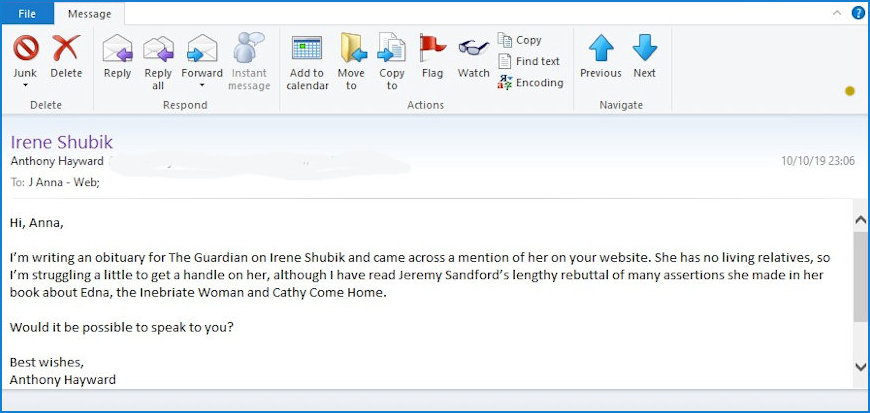
I did suggest that to get closer to Irene's mindset he might want to speak to Aharon Ipale of 'The Mummy' fame, but he, it seems also shed his mortal coils 3 years ago! I'm beginning to feel like a harbinger of death here! I was sorry to see that Irene had died of dementia related effects (whatever that means) and although I hope to print Anthony's obit or provide a link to it, here's the response to our conversation earlier today :
"Thanks for your call earlier. I've now mowed the lawn! I've found out that Aharon Ipale died in Israel three years ago… but I've also discovered that Irene died at Denville Hall actors' retirement home, so I'll give them a call on Monday and ask for the executor of the will to get in touch with me. I think what I've written is fine, but it's always useful to speak to a relative or close friend.
Best wishes, Anthony"
PPS - I wouldn't have written this EVER! But Jeremy Sandford did!
Irene Shubik obituary (The Guardian)
Television drama producer best known for Rumpole of the Bailey
Irene Shubik, who has died aged 89 after having dementia, was a television drama producer whose work ranged from sci-fi to socially relevant modern stories for the BBC's The Wednesday Play and its successor, Play for Today, and adaptations of 19th- and 20th-century literature. Her most significant legacy was Rumpole of the Bailey, which she commissioned as a 1975 Play for Today. She was instrumental in changing the name of John Mortimer's crumpled, liberal defence barrister from Horace Rumbold and casting Leo McKern in the role, while the writer wanted Michael Hordern. When BBC bureaucracy made it difficult to get a series of Rumpole off the ground, Shubik left and took the six scripts she had already commissioned to ITV. She produced the first run, in 1978, setting up a much-loved drama that ran until 1992.
Earlier, Shubik had made a notable contribution to television sci-fi as story editor and producer of Out of the Unknown, a BBC anthology series featuring adaptations of published works, along with new ones from writers such as William Trevor and Terry Nation. The Machine Stops, adapted from EM Forster's short story, won first prize at the 1967 International Science Fiction film festival. Shubik was tireless in her quest to find suitable stories to put on screen and, although she left after the first two series (1965-67) of Out of the Unknown to join The Wednesday Play, she commissioned most of the subsequent 1969 run. She was similarly a guiding light for Wessex Tales (1973), adapted from six short stories by Thomas Hardy. She stamped her mark on it by insisting that each would begin and end with a long shot of Wessex, the characters being seen from afar, dwarfed by the landscape. As a producer of The Wednesday Play from 1967, Shubik's notable successes included The Last Train Through the Harecastle Tunnel (1969), Peter Terson's story of a trainspotter discovering repressed homosexuality, dysfunctional marriages and suggestions of paedophilia among the strangers he meets, and Chariot of Fire (1970), Tony Parker's exploration of the mind of a sex offender facing release from prison.
However, her commitment to the radicalism of The Wednesday Play and Play for Today was more questionable. While lauding the work of Parker, David Mercer and Clive Exton, she was less supportive of those writing politically charged dramas.
Ironically, Edna, the Inebriate Woman (1971), Jeremy Sandford's tale of a down-and-out played by Patricia Hayes – the most celebrated Play for Today production commissioned by Shubik and winner of two Society of Film and Television Arts awards – was one that Shubik herself expended much space on criticising in her 1975 book, Play for Today: The Evolution of Television Drama. Sandford rebutted claims she made about the factual accuracy of both that and his classic 1966 play about homelessness, Cathy Come Home. He added that she had seemed to "sabotage" the potential of Edna, the Inebriate Woman to have a similar impact on politicians and the public.
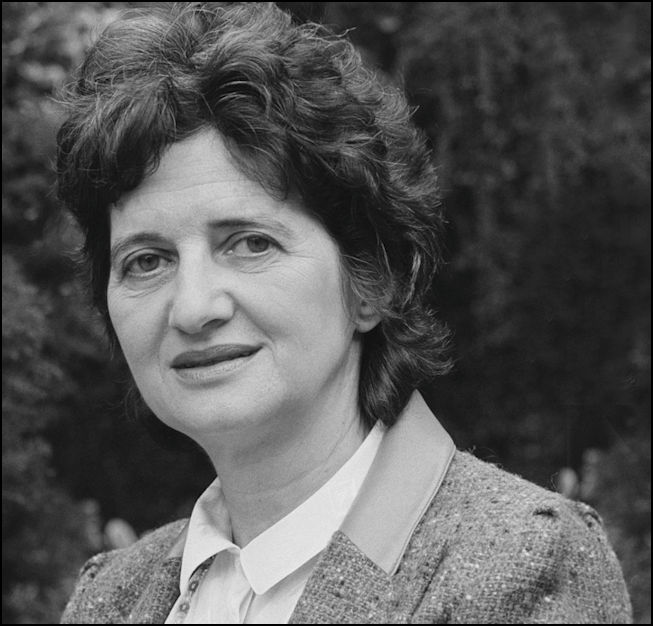
Irene Shubik concentrated on historical drama after launching Rumpole of the Bailey. Photograph: United News/Popperfoto via Getty Images
After launching Rumpole of the Bailey on ITV, Shubik concentrated on historical drama. Her suggestion to the channel that it should turn Paul Scott's The Raj Quartet into a series was met with the idea of trying out his later work, Staying On, as a pilot. Julian Mitchell's adaptation, produced by Granada Television and screened as a single play in 1980, starred Trevor Howard and Celia Johnson in a moving portrait of old age and those colonials who had no wish to return to Britain after Indian independence. Shubik then returned to The Raj Quartet to devise The Jewel in the Crown (1984), working on scripts with the writer, Ken Taylor, and researching locations for this 13-part high point of television drama that was put on a pedestal alongside Granada's earlier production of Brideshead Revisited.
Shubik was born in London, the daughter of Jewish immigrants, Sara (nee Soloveychik), from France, and Joseph Shubik, who came from Russia and traded in the flax market. Shortly after the outbreak of the second world war, she was evacuated to Canada, to live with relatives. On her return, Shubik gained a master's degree in English literature from University College London and, after being turned down by the BBC, emigrated to the US and began her career as a documentary scriptwriter for Encyclopaedia Britannica Films in New York. In 1960, after returning to Britain, she was appointed a story editor on the ITV drama series Armchair Theatre – and told by Sydney Newman, the Canadian-born producer, that he did not want any "costume crap". In the same anthology format – the first featuring sci-fi stories – she created Out of This World (1962).
Newman took Shubik with him to the BBC in 1963 and she was story editor on Story Parade (1964-65), dramatisations of modern novels for the newly launched BBC2. In 1965, with Out of the Unknown, she became a producer, and she stayed in that role for Thirteen Against Fate (1966), Hugh Leonard's adaptations of Georges Simenon stories. Before switching to ITV, she worked on the BBC2 anthology series Playhouse (1973-76). Her commissions included half a dozen original dramas about the paranormal from writers such as Brian Hayles and Trevor. She left Granada before The Jewel in the Crown went into production because she was asked by Columbia Pictures to work on the screenplay of the film The Girl in a Swing (1988), based on Richard Adams's novel. However, her script did not proceed beyond a first draft.
In 1991 Shubik was embroiled in industry controversy when she chaired the Bafta TV Awards jury. She declared Prime Suspect to be best drama serial, but the seven judges publicly stated that four of them had voted for GBH. The ballot papers no longer existed and no blame was attached, but the affair became known as Baftagate. Shubik had a 10-year relationship with the journalist Andrew Dickson, who died in 2004. Her brothers, Martin, an economics professor at Yale University, and Philippe, a cancer researcher, predeceased her. Shubik is survived by her nieces, Claire and Anna.
• Irene Shubik, TV producer and story editor, born 26 December 1929; died 26 September 2019
Innes Lloyd
Producer and Drama Plays favourite rebel whose many finest moments include 'Edna the Inebriate Woman' and 'True Patriot'.
Louis Marks
Producer Drama Plays who brought the trilogies of 'Eleanor Marx' (daughter or Karl and associate of Engels) and 'The Lost Boys' (the story of J M Barrie's involvement with the Llewelyn Davies family) to the silver screen following a distinguished career as script editor and screenplay writer of several 'Doctor Who' episodes.
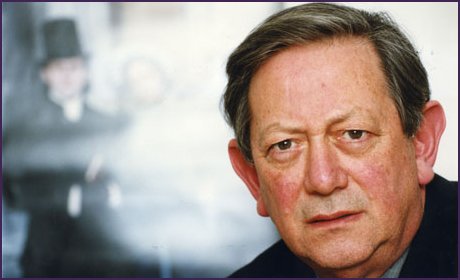
Louis Marks’s work ranged from Doctor Who and Robin Hood to Sophocles. Photograph: Michael Powell (from the Guardian Obituary)

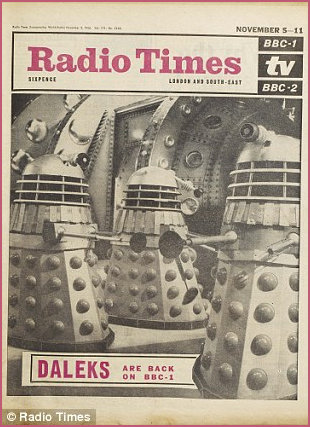
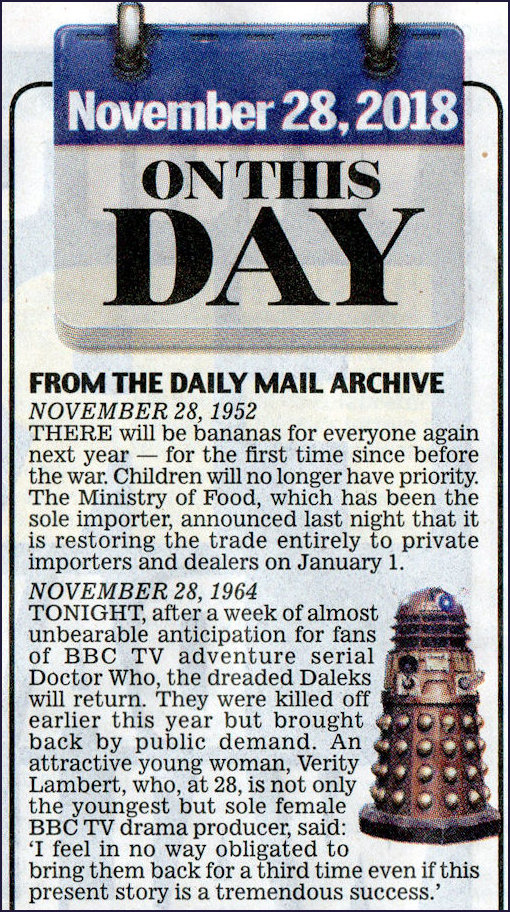
A news snippet from 1964 courtesy of the Daily Mail
This snippet has links on so many levels that maybe it should appear in my 'coincidences' section or maybe it belongs right here on the Television cum Entertainment cum My BBC page. Let's try and do something chronologically. In 1964 I had just started my second year at Loreto Grammar School in Nottingham, the timeframe was 'pre-cancer' which arrived in 1966. I was a carefree kid and political correctness had not entered the arena, but I was bilingual and knew mild swear words in both languages! I liked TV but 'Dr Who' was not on the horizon and would not be until Tom Baker took over the role in 1974 the same year (by which time the Daleks will have had more than a third incarnation) I landed at Television Centre in Drama Plays (oh surely not another coincidence?) But of course there's a link, in 1974 I started working for Gerald Savory and his office was on the 12th floor of the East Tower (the lift stopped at the 11th). To gain access to the East Tower you had to saunter passed the Property Store areas and it just so happens that the Tardis was parked directly opposite our reception entrance whenever it wasn't required for filming. (Or maybe it just went off on its own whenever it wanted to!). My second boss at TC was Irene Shubik and she enjoyed science-fiction as a genre and produced an entire series entitled 'The Mind Beyond' which was quite spooky, but intelligent spooky. She had previously been involved in other science fiction productions. Irene and Verity Lambert eventually became friends when Verity was no longer her subordinate, but I think they both would have objected strenuously to the description of 'an attractive young woman' even then, but that's nothing new, as the BBC Pygmy (still looking for the cutting) I was described as a 'well endowed young lady'; where was Shaun Usher looking? Eventually. there was the falling out over 'Rumpus of the Bailey' and Verity Lambert headed towards a stellar career in the independent section and Irene left the BBC around 1977 and I joined Louis Marks. Louis took up the offices on the 12th floor which had remained empty after Gerald and I had vacated them and we worked together on an eclectic set of Drama Productions. As it happens, of the many coincidences I shared with Louis, Dr. Who was not amongst them but he was involved in script editing and writing several episodes of the saga including ones featuring the Cybermen and the Daleks! Hope that justifies this entry on the 'My BBC' page! Heady days!
The Lost Boys
Louis Marks was one of the nicest people you could ever hope to meet and to have him as a Boss was pure heaven! I worked with Louis on a number of productions under the general banner of 'Play for Today' which is what our department, Drama Plays, was all about; but Louis liked trilogies and we worked together on two of them 'Eleanor Marx' and 'The Lost Boys' a title since hijacked to become synonymous with the horror genre.
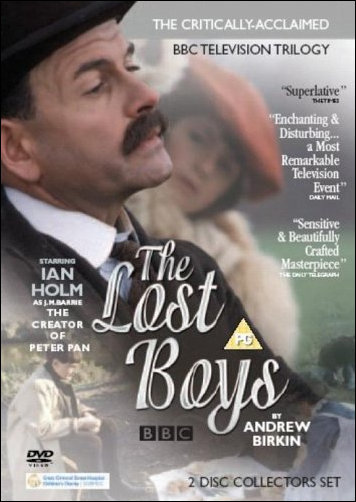
Luckily a DVD of our 'Lost Boys' exists and it is interesting some of the diverse quotes from television critics as part of the selling point!
Our 'Lost Boys' referred to the Llewelyn-Davis family's involvement with J.M. Barrie. Thanks to my involvement with this production I, too, became a slavish fan of Barrie, all things Peter Pan and a supporter of GOSH, the Great Ormond Street Hospital for Children.
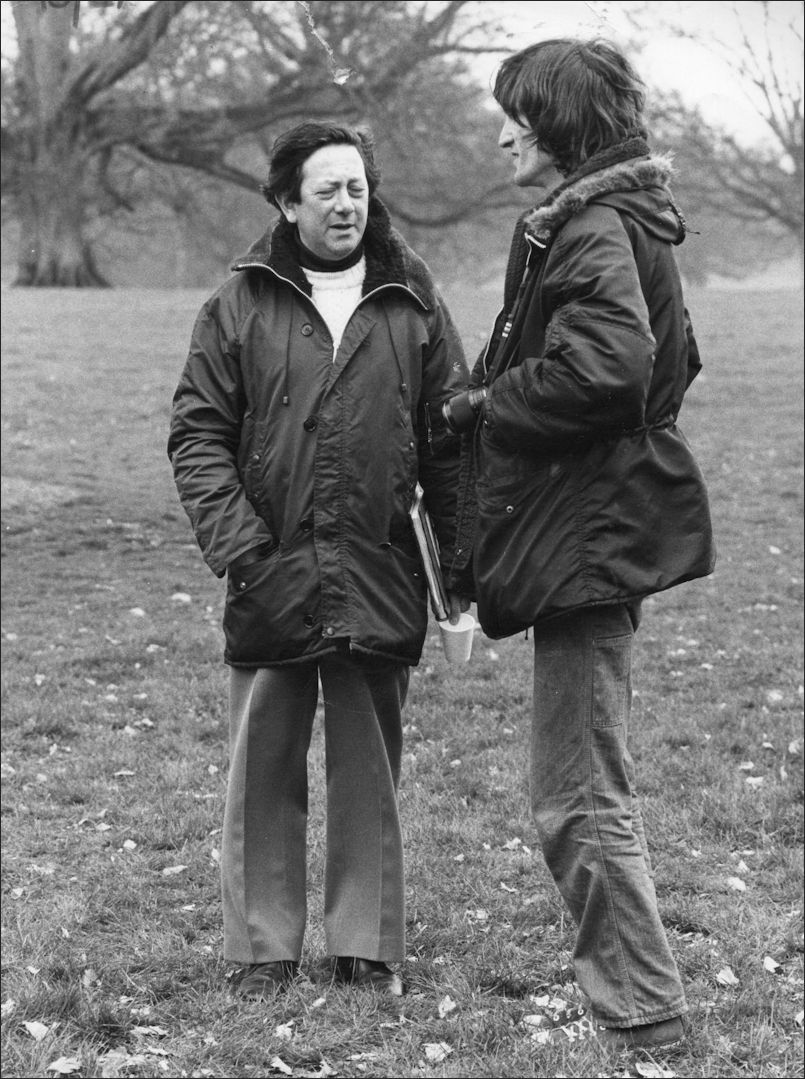
On location in Kensington Gardens (probably) - 1976/7
Since our production, Johnny Depp has brought his own inimitable style to the story and I was amused to see this letter in the Mail on Sunday dated 12th April 2015! I realise it follows the announcement of yet another in-depth study into Barrie (I haven't read it yet so cannot make comment) soon to be released. The books author states that Nico Llewelyn-Davis was consulted, Nico, the youngest of the five brothers has born the heavy burden of family spokesman/chronicler for many years now as he is the only surviving brother to have lived through those very intimate times.
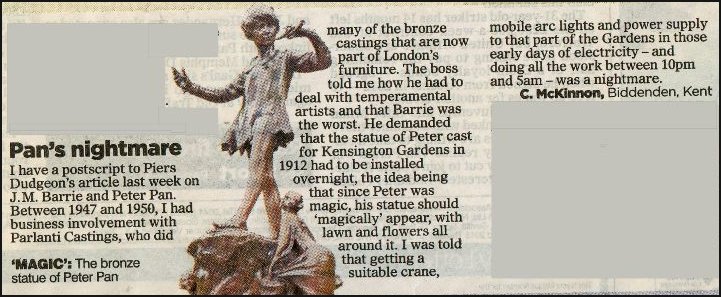
I can imagine Barrie wanting 'Peter Pan' to appear as if by magic! Lucky no puffs of smoke were required!
Louis and I
I wonder if the fact that both our fathers were jewellers and we both studied History of Art as our educational 'majors' that made our working relationship so successful? I liked Louis a lot and he treated me in a very fatherly manner - I have nothing but fond memories of him.
Louis Marks obituary
Writer and producer behind a string of television classics
"Louis Marks, who has died aged 82, was a writer for some of British television's most popular series and the producer of acclaimed single plays and a six-part adaptation in 1994 of George Eliot's Middlemarch. Marks also scripted four Doctor Who adventures, including The Day of the Daleks (1972), with Jon Pertwee as the Doctor, which introduced the Ogrons as the footsoldiers of the Daleks. A scholar of the Italian Renaissance, he transported the fourth incarnation of the Time Lord, played by Tom Baker, to 15th-century Italy for the 1976 adventure The Masque of Mandragora. His script drew on influences such as a Machiavellian comedy, a book-burning priest and the musical surnames Rossini and Scarlatti.
Marks was born in Golders Green, North London, the son of a Jewish jeweller. After attending Christ's college, East Finchley, he read history at Balliol College, Oxford. He then studied Italian Renaissance history in Florence. This led him into writing and academia. He contributed articles to journals, became head of history at a boarding school and, in 1955, founded the monthly magazine Books and Bookmen, of which he was editor.
Marks entered television as a scriptwriter on The Adventures of Robin Hood, starring Richard Greene, an early ITV success after the channel's launch in 1955. He wrote four episodes (1958-59) of the series, whose executive producer, Hannah Weinstein, had fled Senator Joseph McCarthy's anti-communist witchhunts in her native US. He also wrote episodes of Weinstein's subsequent action-adventure series, The Four Just Men (1960) and Danger Man (1964) before graduating to script editor (1965-66) in the later days of the long-running detective series No Hiding Place.
In 1967 Marks created the ITV drama Market in Honey Lane. Made at Elstree Studios, two decades before EastEnders was launched there, it attracted more than 20 million viewers. The following year, the programme was turned into a twice-weekly serial under the shortened title Honey Lane. ITV regional companies moved the revamped, soap-style programme to afternoon or late-night slots, the viewers disappeared and it was axed.
After working as a BBC script editor, Marks became one of its most eminent drama producers, mainly of single plays. One exception came when he commissioned Andrew Birkin to write The Lost Boys (1978), the story of JM Barrie's relationship with the Llewelyn Davies brothers, on whom he based Peter Pan. "Instead of 90 minutes, I felt we needed four or five hours if we were to tell the story without resorting to the simplified characters and dramatic licence of Hollywood biopics," explained Birkin. "Louis listened patiently. To my eternal gratitude, he agreed to a trilogy totalling four-and-a-half hours." It was described by one critic as "a sensitive and beautifully crafted masterpiece".
One of Marks's productions of modern drama in the Play for Today slot was The Falklands Factor (1983), Don Shaw's account of an 18th-century Spanish invasion of the British-held islands that was resolved through negotiation, but with no agreement on sovereignty. Screened only months after the end of the Falklands war, it was inevitably controversial.
In most of his other 30-plus plays for the BBC, Marks showed a preference for the classics, with adaptations of JB Priestley's Time and the Conways (1985), Arthur Wing Pinero's The Gay Lord Quex (1983) and Trelawny of the Wells (1985), Oscar Wilde's Lady Windermere's Fan (1985) and the Jane Austen novel Northanger Abbey (1987).
Taking on Sophocles' Theban plays – Oedipus the King, Oedipus at Colonus and Antigone, adapted and directed by Don Taylor – was particularly ambitious, but their screenings over successive nights in 1984 were widely applauded.
A version of the Muriel Spark novel Memento Mori (1992), directed by Jack Clayton, won acclaim at film festivals around the world, and Harold Pinter's BBC film adaptation of Franz Kafka's The Trial (1993) was another high point.
As well as Middlemarch, Marks produced screen versions of two other George Eliot novels: Silas Marner: The Weaver of Raveloe (1985), which he adapted himself, with Ben Kingsley in the title role, and Daniel Deronda (2002), his final work for television.
Away from his work, Marks was known by friends for his great sense of humour. He left the entertainment industry to run a bed-and-breakfast establishment with his wife, Sonia, whom he had married in the 1950s. She died in 2006. He is survived by their two daughters.
Louis Frank Marks, television writer, script editor and producer, born 23 March 1928; died 17 September 2010"
Page refreshed : 4th January 2021 (G)